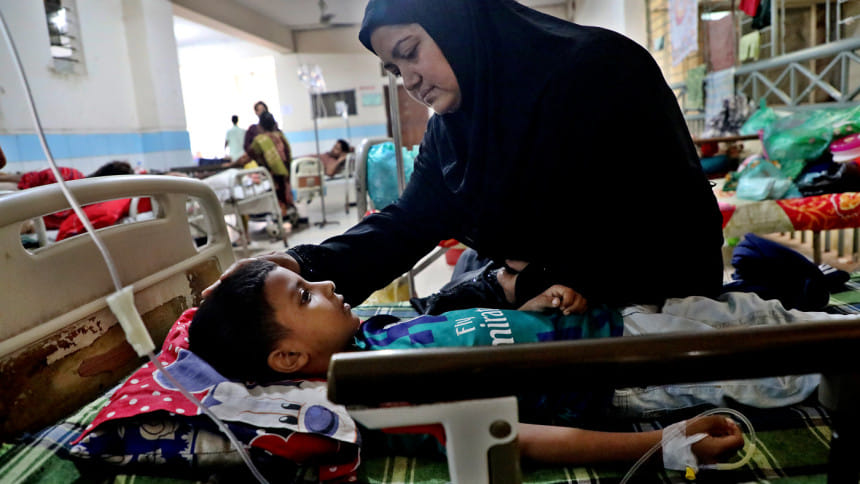Dengue Surge: Delayed diagnosis putting children at greater risk

Six-year-old Omar had been suffering from a fever for 10 days before his condition worsened on Thursday. His uncle, Saddam Hossain, then admitted him to Mugda Medical College Hospital.
"He stopped eating on Wednesday, and after tests, doctors confirmed it was dengue. That's when we rushed him to the hospital," said Saddam, a resident of Razarbagh. "We didn't realise earlier that it was dengue, as his condition seemed stable until Tuesday."
Another patient is 11-year-old Shahed from Jurain. He had a fever for five days, but his parents did not get him tested until his condition worsened.
"My son was diagnosed with dengue on Thursday night and we admitted him immediately," said his mother, Mukta. "We didn't know it was dengue."
Shahed, who is suffering from dengue for the second time, is now in a slightly better condition, she added.
Another child admitted to the hospital had a similar story. Four-year-old Anas from Khilgaon was diagnosed with dengue six days ago and was treated at home. "I admitted him to the hospital on Friday after his condition worsened," said his mother, Rabeya Begum.
Meanwhile, the condition of six-year-old Yasen Arafat is even more critical. Alongside dengue, he is also suffering from pneumonia and anaemia.
"He had a fever for 13 days and was receiving treatment at home. We admitted him to the hospital on Thursday when his health declined," said his mother, Rubi Begum, a resident of Sipahibagh.
According to the Directorate General of Health Services (DGHS), at least 4,026 children aged 0–10 have been hospitalised with dengue this year, while 10 children of the same age group have died out of 110 total deaths so far. In the past 24 hours, 173 dengue patients were hospitalised, raising the total cases to 27,955.
Dr HM Nazmul Ahsan, associate professor at Shaheed Suhrawardy Medical College and Hospital, said many parents are showing negligence this year by not testing their children soon after fever begins.
"Children are often brought to the hospital only when their condition turns critical," he said.
He explained that dengue symptoms appear differently in children.
"For adults, symptoms usually begin with sudden fever, body pain, and eye pain. But in children, it often starts with nausea and coughing. Infants may cry excessively, refuse breastfeeding, or appear unusually tired."
Dr Ahsan warned that dengue reaches the critical stage faster in children.
"For adults, it may take 48 hours to become critical, but in children, it can take just 24 hours. That's why we strongly recommend hospitalisation as quickly as possible."
He also said children are more prone to developing dengue shock syndrome, which is highly dangerous.
Urging guardians to be more cautious, he added, "The risk of infection is high at schools and coaching centres. Most schools don't provide full-sleeve uniforms, but these are essential during dengue season. Children's legs should also be protected with long socks and shoes."

 For all latest news, follow The Daily Star's Google News channel.
For all latest news, follow The Daily Star's Google News channel. 



Comments